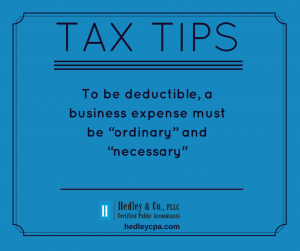 When you are self-employed, your business profits are taxed to you at federal rates as high as 39.6%. Add self-employment taxes, which in 2015 will amount to 15.3% of the first $118,500 of your net self-employment earnings plus 2.9% of any earnings over that amount. Then there’s an additional 0.9% Medicare surtax on earnings in excess of $200,000 ($250,000 if married filing jointly). At tax rates like these, it pays to take steps to reduce your tax burden.
When you are self-employed, your business profits are taxed to you at federal rates as high as 39.6%. Add self-employment taxes, which in 2015 will amount to 15.3% of the first $118,500 of your net self-employment earnings plus 2.9% of any earnings over that amount. Then there’s an additional 0.9% Medicare surtax on earnings in excess of $200,000 ($250,000 if married filing jointly). At tax rates like these, it pays to take steps to reduce your tax burden.
STEP ONE: DEDUCT BUSINESS EXPENSES
Be sure you have an organized system for recording your expenses. To be deductible, a business expense must be “ordinary”(common and accepted in your trade or business) and “necessary” (helpful and appropriate for your trade or business). Since personal expenses are generally not deductible, it’s smart to have a separate business bank account and use a separate credit card for business purchases.
STEP TWO: DEDUCT HEALTH INSURANCE PREMIUMS
You may qualify to deduct premiums paid for medical, dental, and qualified long-term care insurance coverage for you, your spouse, and your dependents.* The coverage may include children who haven’t reached age 27 by the end of the year, even if you don’t claim them as dependents on your tax return.
Unlike health insurance premiums paid for employees, the self-employed health insurance deduction won’t save you self-employment taxes. However, it will lower your taxable income. You must meet certain requirements to qualify for the deduction.
STEP THREE: DEDUCT RETIREMENT PLAN CONTRIBUTIONS
Funding a retirement plan can also save you significant tax dollars. Within limits, plan contributions will be tax deductible.** Several types of plans may be suitable for you as a self-employed taxpayer, including a simplified employee pension (SEP) plan, a savings incentive match plan (SIMPLE), or a solo (individual) 401(k) plan. Each plan has specific features and requirements that you will want to weigh carefully before making a choice.
* Dollar limits apply to the deduction for long-term care insurance premiums.
** Although deductible for income-tax purposes, contributions to your own retirement plan account do not reduce earnings subject to self-employment taxes